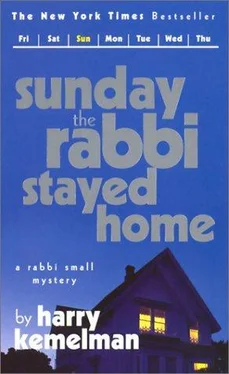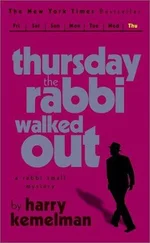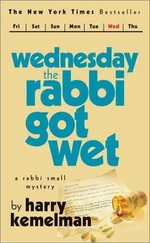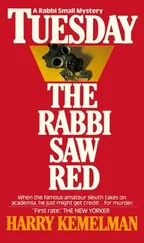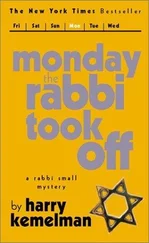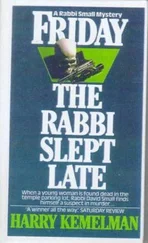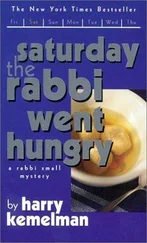Harry Kemelman - Sunday the Rabbi Stayed Home
Здесь есть возможность читать онлайн «Harry Kemelman - Sunday the Rabbi Stayed Home» весь текст электронной книги совершенно бесплатно (целиком полную версию без сокращений). В некоторых случаях можно слушать аудио, скачать через торрент в формате fb2 и присутствует краткое содержание. Город: New York, Год выпуска: 2002, ISBN: 2002, Издательство: iBooks, Жанр: Иронический детектив, на английском языке. Описание произведения, (предисловие) а так же отзывы посетителей доступны на портале библиотеки ЛибКат.
- Название:Sunday the Rabbi Stayed Home
- Автор:
- Издательство:iBooks
- Жанр:
- Год:2002
- Город:New York
- ISBN:978-0743452380
- Рейтинг книги:3 / 5. Голосов: 1
-
Избранное:Добавить в избранное
- Отзывы:
-
Ваша оценка:
- 60
- 1
- 2
- 3
- 4
- 5
Sunday the Rabbi Stayed Home: краткое содержание, описание и аннотация
Предлагаем к чтению аннотацию, описание, краткое содержание или предисловие (зависит от того, что написал сам автор книги «Sunday the Rabbi Stayed Home»). Если вы не нашли необходимую информацию о книге — напишите в комментариях, мы постараемся отыскать её.
Sunday the Rabbi Stayed Home — читать онлайн бесплатно полную книгу (весь текст) целиком
Ниже представлен текст книги, разбитый по страницам. Система сохранения места последней прочитанной страницы, позволяет с удобством читать онлайн бесплатно книгу «Sunday the Rabbi Stayed Home», без необходимости каждый раз заново искать на чём Вы остановились. Поставьте закладку, и сможете в любой момент перейти на страницу, на которой закончили чтение.
Интервал:
Закладка:
“And did you agree?”
“For us it’s easy. Rabbi. As past presidents, we are both permanent members of the board. And to join another temple is just a matter of paying an extra membership fee. It’s like a donation. Even when I was president. I was a member of the synagogue in Lynn, and Jacob here is a member both in Lynn and Salem. But in the course of telling me what was on his mind, you came up for discussion. Paff asked me to approach you about coming over, on a long-term contract and at an increase in salary. That’s what I was discussing with Jacob just before you came in.”
The rabbi looked over at Wasserman, but the old man’s face was impassive. “I didn’t think I was so great a favorite of Mr. Paff s.” he said to Becker.
“Look. Rabbi. I won’t try to kid you. I’m sure that although
Paff appreciates your work here, his main object in making the offer is that he expects it will pull members. But what do you care if you’re bettering yourself?”
“And would I be bettering myself. Mr. Becker?”
“By three thousand dollars a year, and a long-term contract. Even if this row with Gorfinkle hadn’t occurred, you wouldn’t be sure that your contract would be renewed. I guess that’s bettering yourself. If you’re not sure, ask Mrs. Small, who buys the groceries.”
But the rabbi replied. “As things now stand. Mr. Becker. I am the rabbi of the Jews of Barnard’s Crossing. I am the rabbi of the community and not merely the rabbi of a particular temple. And that is the way I think of my function. A rabbi is not part of the temple furniture.”
“But the cantor—”
“The cantor is different. He needs a temple, or at least a congregation, in order to exercise his function. Can he sing to himself? But a rabbi does not. No doubt, if the community continues to grow, sooner or later a Reform temple will be established and a portion of our members will split away from us to join it. And no doubt, they will get a rabbi. But that break will be for ideological reasons and hence justified. Their rabbi will be the rabbi of the Reform Jews of Barnard’s Crossing, while I remain the rabbi of its Conservative Jews.”
“But congregations do split.” Becker insisted.
“All too often, perhaps. When the split was not on ideological grounds, it was apt to be geographical. Jews would begin moving out of one area into another, and because it was considered a breach of the Sabbath to ride to services, another temple would be set up in order to have a place of worship within walking distance of the new area. That, too, would be reasonable.
“But the split that you plan is neither ideological nor geographical. You will have the same kind of Jews in the new temple as in the old, and the services will be virtually similar. In effect, you are setting up a competing temple, and you would like me to be its rabbi. No. thank you. Nor would I remain in my present job under those conditions. A temple is not a business enterprise in which competition is good for trade. But you will come to think of your temple in that way, and you will force the same kind of thinking on Gorfinkle and his group. Come join our temple—we have air conditioning, softer seats. Our cantor has a better voice, and our rabbi delivers shorter and snappier sermons. Hold your Bar Mitzvah or your wedding in our vestry. We give trading stamps.”
“Now look here. Rabbi—”
“Mr. Paff doesn’t need me. A temple doesn’t need a rabbi, and a rabbi doesn’t need a temple. The rabbi’s functions in the temple—leading prayers and delivering sermons—are the most minor part of his duties. The first any thirteen-year-old boy can perform, and the second, isn’t it for most a kind of relief to break the monotony and tedium of the service? No. Mr. Becker. I have no intention of being the extra added attraction of a new temple.”
“But if Gorfinkle succeeds in voting you out—” The rabbi looked at Wasserman in mute question.
The old man spread his hands. “In this world. Rabbi, you’ve got to make first a living. Here Paff offers you a job, at more money yet. All right, maybe the conditions aren’t perfect. Where are they perfect? But it’s a living; it’s parnossah.”
The rabbi bit his lip in vexation. He had assumed that Wasserman at least would understand. “And is Barnard’s Crossing the only place where I can make a living? No, Mr. Wasserman, if this split goes through, I will not accept a contract from either Mr. Paff s or Mr. Gorfinkle’s group. I will leave Barnard’s Crossing.”
Chapter Twenty-Six
As Stuart Gorfinkle drove back to the cookout from Lynn, he felt a totally unreasonable resentment against his parents, especially his father. Why were there always strings attached when his father let him have the car? They were only going to his Aunt Edith’s to eat; his uncle could have picked them up. He wondered uneasily if the kids had been able to find shelter somewhere when the rain really pelted down. And the lightning, had it been as bad at the beach as on the drive to Lynn?
The rain had let up and now was little more than a heavy mist. At Tarlow’s Point he stopped his car and plunged down the path. When he came to the little grove of pine trees, he could see the beach and that no one was there. From the litter, the empty beer cans, the wet cellophane wrappers, he knew that they had left unexpectedly and in a hurry.
Then he saw the arrow on the log. Carefully he made his way to the house and up the back steps. He put his ear to the door and listened hard but heard nothing. He circled the house, went up to the front door, and again listened, then essayed a timid knock. He waited, listening, and this time he thought he heard something. He knocked harder and called “It’s me, Stu. You kids there?”
Instantly the door was thrown open, and his friends crowded around the doorway.
“Hey, you had me going there for a while.”
“We thought you weren’t coming back. We left an arrow with lipstick. Did you see it?”
“How’d you get in?” Stu asked. “Was the door open?”
“Nah, we climbed in through a window in back.”
“Well, we better get going.” said Stu. “The cruising car goes by here, and they check the unoccupied houses. They got a list”
They piled into the car, and Stu turned on the ignition. From in back Adam Sussman called. “Say, how about Moose?”
“What about him?” asked Stu.
“He’s in there. He passed out, and we had to put him to bed.”
“We’d better get him. We can’t leave him in there like that.”
“There’s no room for him, especially the shape he’s in.”
“He wasn’t invited to this party.”
“Yeah, but he got us in out of the storm.”
“I want to go home,” wailed one of the girls. “My folks will be awfully worried.”
“Get going, Stu,” said Bill Jacobs. “We can swing back afterward and pick him up.”
Stu and Bill Jacobs took Didi home last, and Alan Jenkins went along because his motorcycle was parked in the Epstein garage. The house was dark when they arrived, and on the kitchen table Didi found a note from her mother: “Gone to the movies—maybe somewhere for coffee afterward.”
“You guys want some coffee?” she asked. “Yeah. I could use something hot,” said Jacobs.
“I should be starting back.” said Jenkins, “but—okay, I’ll have some too.”
“But what about Moose?” asked Stu.
“He’ll keep.” said Jacobs. He laughed harshly. “He’s good for hours.”
“The way he poured that stuff down—” Stu shook his head. “Still, you wouldn’t think beer would have that effect on him. At school I’ve seen guys who drank the stuff practically all night—”
“It’s wasn’t the beer,” Bill Jacobs explained, “although he had quite a few of those. As soon as we got into the house, he found himself a bottle of Scotch. He did the same trick with that—you know, tossing his head back and taking it down. He must’ve polished off half the bottle in a couple of swallows.”
Читать дальшеИнтервал:
Закладка:
Похожие книги на «Sunday the Rabbi Stayed Home»
Представляем Вашему вниманию похожие книги на «Sunday the Rabbi Stayed Home» списком для выбора. Мы отобрали схожую по названию и смыслу литературу в надежде предоставить читателям больше вариантов отыскать новые, интересные, ещё непрочитанные произведения.
Обсуждение, отзывы о книге «Sunday the Rabbi Stayed Home» и просто собственные мнения читателей. Оставьте ваши комментарии, напишите, что Вы думаете о произведении, его смысле или главных героях. Укажите что конкретно понравилось, а что нет, и почему Вы так считаете.
